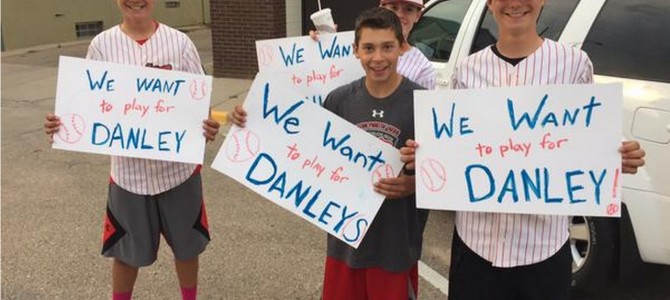
Domingo Ayala is a character on YouTube who does hilarious instructional videos about baseball. He claims to have been “born and raised in Puerto Plata, DR sometime between 1978 and 1988 (records have not been verified).” He is full of confidence and surprising baseball ability for a jokester. His most recent video pretends to be a public apology:
Here’s my transcription:
Hi, how you are doing? This a message to all my fan. In a recent video — the tops bunt video — you have to listen to Mr. Coach Garrido yell at me and my teammates [clip of Coach Garrido yelling]. A lot of you have complain about have to listen to this speech. In this speech, Mr. Coach Garrido use a bad word. I’m sorry you have to listen to that. Coaches should never yell at the team. I just want you all to know that I no take this lightly. I already talk to my Uncle Mannie and he’s going to administration with his lawyer to get Mr. Coach Garrido fired because that’s what you should do if something no go your way. I hope you and your kids will never have to play for such a terrible coach like Mr. Coach Garrido.
Unfortunately, it’s too late for 120 major leaguers who used to play for him. I have also contact the NCAA and they are investigate the situation and decide if they’re going to take away his five national championship and his over 1900 college win for using a bad word one time. Hopefully your kid will have to play with good coaches who pat you on the butt and give you high five when you strike out. And who also give you snack at the end of the game. As coach you are trying to prepare your player for the next level and of course the next level is always easier. So let this be a lesson of coaches. You should never say a bad word. Ever. Or else you get fired. Thank you. This will never happen again.
Unfortunately this isn’t just satire.
Right now, in a small town in northern Colorado, the most successful high school baseball coach in America is about to lose his job for, it seems, being tough.
Jim Danley has been coaching Eaton High School baseball for 44 years. Under his leadership, the team has won 11 Colorado high school baseball championships, a state record. That includes the state championship this year. His overall career record is stunning: 807-163-2. The team has had the highest winning percentage of any baseball team in America for more than 25 years. They’ve racked up 21 Spring and Summer championships since 1994 and were ranked the best small school in the country this year, the top school program in Colorado and the 17th overall nationally. At least a dozen players from this tiny town have been drafted by Major League teams since 2000. Danley, who has served for decades with the same coaching staff, is nationally recognized for his coaching abilities, including having been named the National High School Baseball Coach of the Year in 2003.
But the school board overseeing Danley wants him to take coaching classes, or be fired. Really.
After complaints from a few parents that he was too exacting, the school board came up with a “Performance Improvement Plan” for the legendary coach, marking his first professional review of his career. He expected a review to be a bit more favorable. Instead, it had 13 points he had to agree to or lose his job. He’s required to take an online coaching course about “promoting a safe and respectful environment,” hire back a recently dismissed assistant coach, run all recruiting through the athletic office, create a policy manual chock full of guidelines, encourage his athletes to play other sports as well, and only permit spring championship banners to be hung on the outfield fence. And “if any of these requirements are violated, coach will be terminated immediately.” For what it’s worth, 17 of the 19 players on the most recent team do play in other sports, including basketball, football and wrestling.
Coach Danley, for his part, says this performance improvement plan isn’t about performance, isn’t about improvement, and it’s not a plan. He’s refused to sign it. The school board president had been saying publicly that this would mean Danley had “chosen” to resign. But Danley went public with what he was being asked to do. You can watch a local news report on the matter here.
Danley is accused of “bullying,” according to the Denver Post. One mother said of Danley’s son, who is affiliated with the coaching staff, “Our kids are in tears. The things he says to these boys you can’t even (hear) because you would just start crying.”
It’s difficult to judge the merits of the charge without knowing specifics. And for his part, Danley says the letters from the parents to the school board contained information nobody had previously shared with him. The letters were only released when a local newspaper requested them under a records transparency law. Along with the letters, email discussions from board members were brought to light that showed private discussion of Danley’s employment, which is a violation of state transparency laws.
In any case, winning isn’t everything, and Danley’s overall performance should be evaluated apart from his success on the field. But when every starter from the school’s 2011 high school team went to college on a baseball scholarship, it’s clear that the program might be worth some tough words or exacting demands.
Going back to Domingo Ayala’s video, success on the field is not going to happen from “good coaches who pat you on the butt and give you high five when you strike out” or who “give you snack at end of the game.” The next level of play is not “always easier.” And bad and harsh words are something children can actually handle.
In fact, tough teachers tend to be the ones who get the most out of us, current decades-long self-esteem hysteria to the contrary. For more on that, read this excellent Wall Street Journal article by Joanne Lipman, which begins:
I had a teacher once who called his students “idiots” when they screwed up. He was our orchestra conductor, a fierce Ukrainian immigrant named Jerry Kupchynsky, and when someone played out of tune, he would stop the entire group to yell, “Who eez deaf in first violins!?” He made us rehearse until our fingers almost bled. He corrected our wayward hands and arms by poking at us with a pencil.
Today, he’d be fired. But when he died a few years ago, he was celebrated: Forty years’ worth of former students and colleagues flew back to my New Jersey hometown from every corner of the country, old instruments in tow, to play a concert in his memory. I was among them, toting my long-neglected viola. When the curtain rose on our concert that day, we had formed a symphony orchestra the size of the New York Philharmonic.
I was stunned by the outpouring for the gruff old teacher we knew as Mr. K. But I was equally struck by the success of his former students. Some were musicians, but most had distinguished themselves in other fields, like law, academia and medicine. Research tells us that there is a positive correlation between music education and academic achievement. But that alone didn’t explain the belated surge of gratitude for a teacher who basically tortured us through adolescence.
Because Danley is such a huge deal in high school baseball, he’s been interviewed widely. And he is always talking about baseball as a means to teach small-town kids how tough they are and how much they can handle mentally.
“In school we work with kids’ minds. The mind can think and the mind can judge, but the third thing that the mind can do is to will, and I think that is something that we don’t pay much attention to in modernday society,” Danley said. “You can find no successful people who didn’t get there without the ability to will their way through the tough times.”
and
Trust me, Coach Ervin and I know failure, we took over a team in 1972 that had finished toward the bottom of the league for quite a few years, and we first had to convince the kids that they could stay in games with the average teams, and then hope for heroics late. We didn’t get many of those heroics back then, but you only need them to appear every once in a while to convince kids that it’s always possible. We took the advantage that we had—of being a tough bunch of farm kids—and focused on how mental toughness could overcome an otherwise superior opponent. This over time works itself up to making the kids believe that they can beat the best teams. After a while, the pendulum swings the other way, and you have to then convince the kids that they can be beaten by any other team as well. That’s tougher to do and more of a struggle, but a good problem to have…
I don’t think it’s any secret, but Coach Ervin and I have done our best to instill two concepts in our players: mental toughness, and unflappability. The greatest leaders in our nation’s history have been unflappable, having to overcome defeat before reaching the success we remember them for, and were able to—as Rudyard Kipling states in his famous poem “If”—treat both triumph and disaster just the same. We’re very proud of our results, but we care a lot more about the effort put into the battle, than about whether the ball bounces our way or not.
At the school board meeting in Eaton last night, the public was so outraged over the issue that the school board was forced to hold back on its plan. One former player, who had some time in the pros and is now a coach at a university, came from Oklahoma to offer his support. Another former player came 1200 miles from Texas to voice his support.
What these adults know is what a few of Eaton’s parents don’t know. As the Journal article explains, tough teachers have successful students because pain is good, tough programs are good, learning how to fail is good, being strict is a godsend to children, and stress promotes resilience. Eaton’s program is special and nationally renowned. A wise school board would be hesitant to put short-sighted complaints ahead of that.









